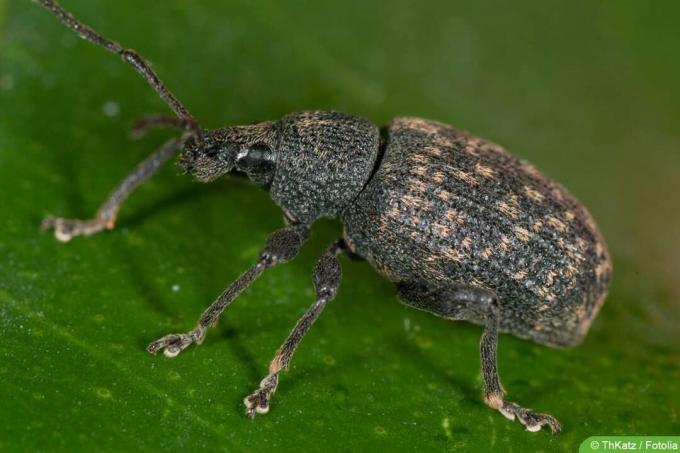

Table of contents
- collect bugs
- lay out traps
- nematodes
- tansy tea
- wormwood manure
- coffee grounds
- Prevent vine weevil
- Natural enemies
The vine weevil is one of the most feared pests. You can successfully combat the pest with a few home remedies. There are also methods to prevent it from settling in the garden in the first place.
collect bugs
The beetles prefer to attack shrubs such as rhododendrons or cherry laurel. The beetles are usually introduced into the garden by new plants and then spread. An infestation can usually be recognized by circular feeding marks on the leaf edges.
An effective way is to collect the beetles. This will prevent the eggs from being laid and the insects from multiplying. If you have found an infestation, you have to go hunting in the evening, because the insects are nocturnal.
Instructions for collection
- Spread cloth under plants
- Shake off branches well
- pick up bugs
- Dispose of beetles in organic waste
In the early morning hours there are usually still individual specimens on the plants. You can still collect these by hand.
lay out traps
You can collect the beetles more efficiently if you set traps in a targeted manner. You can hang upside down flower pots filled with wood shavings on the affected plants. The beetles use the pots as a hiding place during the day and are easy to catch there.
Tip:
The beetles also like to hide in cracks in corrugated boards. Lay them out around the affected plants on the ground.
nematodes
Nematodes are an effective measure, especially against the larvae of the beetle. Nematodes are roundworms that the larvae specifically seek out. They nest in the larvae and destroy them from the inside.
You can get the nematodes in specialist shops and they are introduced into the soil around the affected plants. To do this, the nematodes are added to the irrigation water and you only have to water the plants with them. The nematodes get to work immediately and fight the larvae within a short time.

As a rule, you also have to bring out the nematodes repeatedly, because the beetles keep laying eggs. As long as the nematodes find food in the soil, they remain in the area of the affected plants. If there is no more food, the roundworms die off again. If the next generation is infested again, bring the nematodes back out with the irrigation water.
tansy tea
Tansy is a good remedy against harmful insects and also helps against the vine weevil. You can prepare it as manure, in acute cases you should prepare a strong tea.
Instructions for tansy tea
- 30 g dried herb
- 1 liter of water
- boil water
- scald the herb
- Let the tea cool down
- Filter off the herb
- Spray plants with tea
A notice:
If you use liquid manure, the plant absorbs the ingredients. This will let the vine weevil off the plants and you can also prevent an infestation.
wormwood manure
For the liquid manure they need around 300 grams of fresh herbs, which they put into ten liters of water. Put everything in a bucket that you can cover. The manure is ready when it stops foaming. Depending on the weather, this takes around three to four weeks.
A notice:
In acute cases, you can spread the liquid manure undiluted on the plants. As a preventive measure, you can dilute the wormwood slurry with water in a ratio of 1:10.
coffee grounds
Coffee grounds not only help against the harmful bugs, but are also a fertilizer. Once a month, work the coffee grounds into the soil around the vulnerable plants. The intense smell drives away the beetles and prevents them from laying eggs.
A notice:
Garlic has a similar effect due to its intense smell. As an alternative to the coffee grounds, you can also incorporate crushed garlic.
Prevent vine weevil

Instead of fighting the bugs, it's easier to prevent an infestation. If you buy new plants, check them for an infestation. To be on the safe side, you can first place the plants separately and observe whether there are any pests. Only when there is no longer any danger can you place the newly purchased plants in the garden. Different predators that you can settle in the garden are also helpful against the pests.
Natural enemies
- birds
- common toads
- mole
- Hedgehog
- lizards
- ground beetle
Create areas in the garden where predators can thrive. Shelters such as earwigs directly on the plants are also helpful. They also settle in inverted pots filled with wood shavings.
 garden editorial
garden editorial I write about everything that interests me in my garden.
Learn more about pests

Ants in the raised bed: what to do?
If ants are found in the raised bed, quick action is required. With the right means and measures, however, the insects can be easily controlled or driven away.

Big holes in the garden: which animal was it?
Whether in the lawn or "just" in flower beds, holes in the ground make no gardener happy. But who causes the holes? And how do you get rid of them? We explain causes and strategies for annoying visitors underground.

Combat Little Red Spider | 7 tips for garden & balcony
Although the little red spider is harmless because it neither stings nor transmits diseases, its occurrence is still a thorn in the side of many people. The little creatures become particularly annoying when they are not just limited to infesting plants, but also spread out on the balcony or even in the apartment. Fortunately, effective biological measures exist to control the arachnids.

Rats in the garden: what to do? How to fight the plague of rats
Many people are disgusted just at the thought of rats: after all, the harmful rodents have been considered carriers of dangerous diseases for thousands of years. The animals also cause considerable damage in the house and in the garden. This is how you get rid of the plague again - sustainably and effectively.

Ultrasonic Rat Control – Does Ultrasound Help Against Pests?
Rats in the house or in the garden are not only disgusting, they can also quickly become a problem. But what can you do about it? Ultrasonic rat control is often recommended. However, the method is very controversial. More about this is here.

Combat willow borers: damage picture and means | Is the caterpillar poisonous?
The name gives it away: willow borers love pastures. They especially like to pierce old specimens. But they are also strangers who occasionally visit our fruit trees. Unfortunately, it is not just a short detour. They stay for years and multiply diligently. Their caterpillars eat huge holes in the trunk. This ends sadly, because the tree eventually dies. But nobody has to give it up without a fight.

